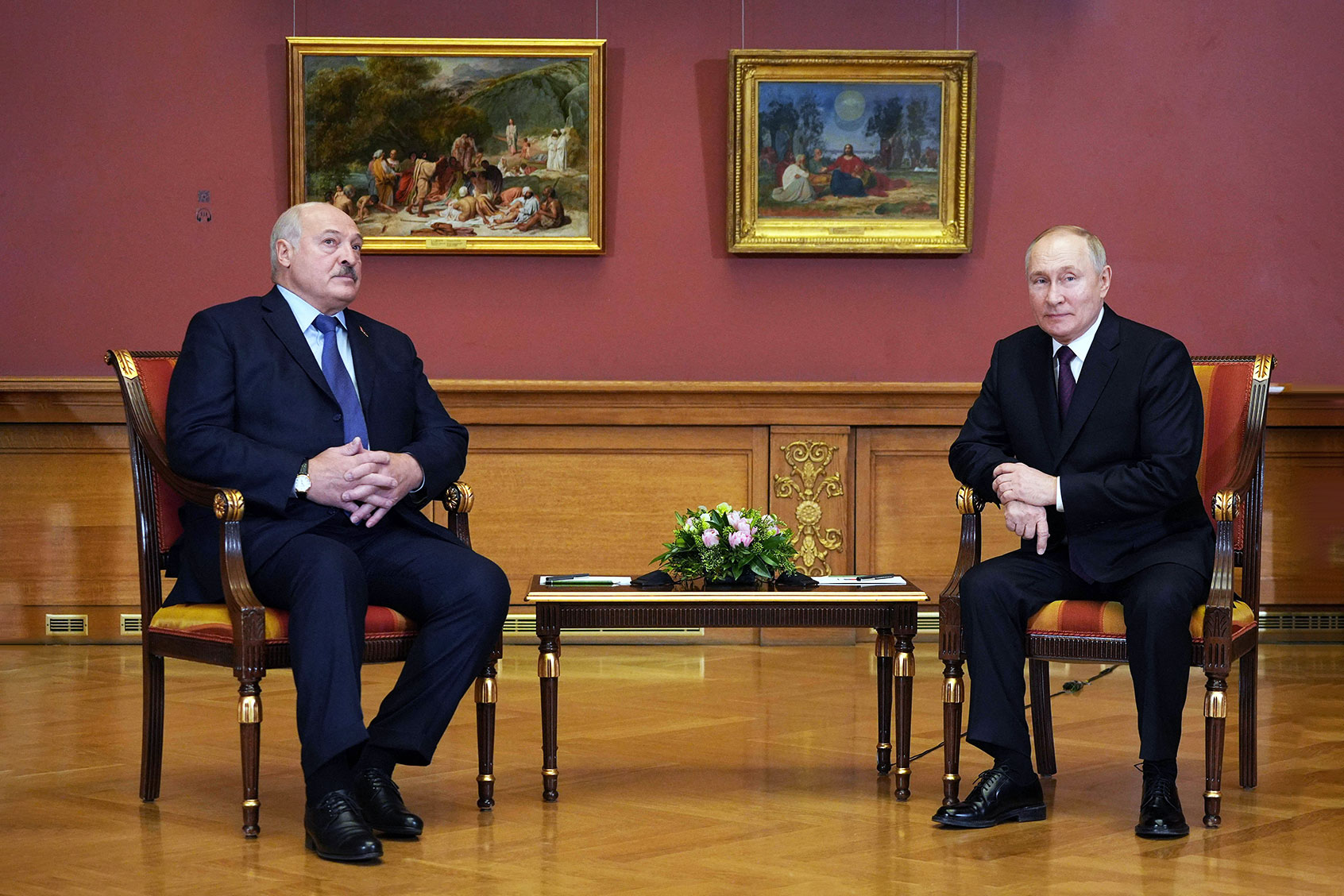Vladimir Putin’s announcement over the weekend that Russia will deploy tactical nuclear weapons in Belarus marked a further escalation of potentially cataclysmic tensions over the war in neighboring Ukraine. As the Associated Press reported, “Putin said the move was triggered by Britain’s decision this past week to provide Ukraine with armor-piercing rounds containing depleted uranium.”
There’s always an excuse for nuclear madness, and the United States has certainly provided ample rationales for the Russian leader’s current display. American nuclear warheads have been deployed in Europe since the mid-1950s, and current best estimates say 100 are there right now — in Belgium, Germany, Italy, the Netherlands and Turkey.
Count on U.S. corporate media to (appropriately) condemn Putin’s announcement while dodging key realities of how the U.S., for decades, has been pushing the nuclear envelope toward conflagration. The U.S. government’s violation of its pledge not to expand NATO eastward after the fall of the Berlin Wall — instead, the alliance expanded into 10 Eastern European countries — was only one aspect of official Washington’s reckless approach.
During this century, the runaway motor of nuclear irresponsibility has been mostly revved up by the United States. In 2002, George W. Bush withdrew the U.S. from the Anti-Ballistic Missile Treaty, a vital agreement that had been in effect for 30 years. Negotiated by the Nixon administration and the Soviet Union, the treaty declared that its limits would be a “substantial factor in curbing the race in strategic offensive arms.”
His lofty rhetoric aside, Barack Obama launched a $1.7 trillion program for further development of U.S. nuclear forces, under the euphemism of “modernization.” To make matters worse, Donald Trump pulled the U.S. out of the Intermediate-Range Nuclear Forces Treaty, a crucial pact between Washington and Moscow that had eliminated an entire category of missiles from Europe since 1988.
This madness has been resolutely bipartisan. Joe Biden quickly dashed hopes that he would be a more enlightened president about nuclear weapons. Far from pushing to reinstate the canceled treaties, from the outset of his presidency Biden has boosted measures like placing anti-ballistic missile systems in the new NATO nations Poland and Romania. Calling them “defensive” does not change the fact that those systems can be retrofitted with offensive cruise missiles. A quick look at a map would underscore why such moves were so ominous when viewed through the Kremlin windows.
Want a daily wrap-up of all the news and commentary Salon has to offer? Subscribe to our morning newsletter, Crash Course.
Contrary to his 2020 campaign platform, Biden has insisted that the United States must retain the option of first use of nuclear weapons. His administration’s landmark Nuclear Posture Review, issued a year ago, reaffirmed rather than renounced that option. A leader of the organization Global Zero put it this way: “Instead of distancing himself from the nuclear coercion and brinkmanship of thugs like Putin and Trump, Biden is following their lead. There’s no plausible scenario in which a nuclear first strike by the U.S. makes any sense whatsoever. We need smarter strategies.”
Daniel Ellsberg — whose book “The Doomsday Machine” truly should be required reading in both the White House and the Kremlin — summed up humanity’s dire predicament and imperative when he told the New York Times days ago: “For 70 years, the U.S. has frequently made the kind of wrongful first-use threats of nuclear weapons that Putin is making now in Ukraine. We should never have done that, nor should Putin be doing it now. I’m worried that his monstrous threat of nuclear war to retain Russian control of Crimea is not a bluff. President Biden campaigned in 2020 on a promise to declare a policy of no first use of nuclear weapons. He should keep that promise, and the world should demand the same commitment from Putin.”
We can make a difference — maybe even the difference — to avert global nuclear annihilation. This week, TV viewers are reminded of such possibilities by the new documentary “The Movement and the ‘Madman,’” available from PBS. The film “shows how two antiwar protests in the fall of 1969 — the largest the country had ever seen — pressured President Nixon to cancel what he called his “madman” plans for a massive escalation of the U.S. war in Vietnam, including a threat to use nuclear weapons. At the time, protestors had no idea how influential they could be and how many lives they may have saved.”
In 2023, we have no idea how influential we can be and how many lives we might save — if we’re really willing to try.
Read more
from Norman Solomon on war, power and politics

